Education
We now need, it seems, a Voice for bigots
The best argument against having an explicit legislated or constitutional right of freedom of religion in Australia comes right out of the playbook of the No campaign during the referendum on a constitutional Voice for Indigenous Australians. There’s no particular problem of giving expression to one’s beliefs in this country, and almost any attempt to Continue reading »
CAPITALISM, SOCIALISM AND DEMOCRACY 80 YEARS LATER: WEA WEBINAR MEETING
2024 WEA Conference: CAPITALISM, SOCIALISM AND DEMOCRACY 80 YEARS LATER: Looking at capitalism today in light of its past and possible future
We are going to close the Discussion Forum https://capitalismanddemocracy2024.weaconferences.net/papers/ with a Webinar meeting to be held on Wednesday, March 27th, between 4:00 pm and 6.30 pm UK time zone.
Platform: Google Meet (xef-kpdf-ibw)
4:00 pm UK time zone Welcome and introduction of the Conference Leaders Dr. Arturo Hermann and Dr. Maria Alejandra MadiPanelsAuthorsPapers/ Titles4:15 to 4:45 pm UK time zone 4:15-4:25 pm John Willoughby From elitist to participatory: the curious evolution of Schumpeter’s model of socialism4:25- 4:35 pmDavi Antunes & MaríliaTunesDemocracy, neoliberalism, and financial oligarchyQ&A: 4:35- 4:45 pmThe attendees will send their questions via chat box. 4:45 to 5:15 pm UK time zone Authors Papers/ Titles4:45-4:55 pmPeter Bofinger Discovering the true Schumpeter: New insights into finance and growth nexus4:55-5:05 pmDavide Gualerzi Institutional change in the post-war periodQ&A: 5:05-5:15 pmThe attendees will send their questions via chat box. 5:15 to 5:50 pm Authors Papers/Titles 5:15- 5:25 pm Jesper JespersenKeynes’s analytical view of the ‘long run’5:25- 5:35 pmLászlo Kulin How competitiveness and sustainability be preserved? Multi-speed economics around tthe globeQ&A: 5:35-5:45 pmThe attendees will send their questions via chat box. 5:45 to 6:15 pm UK time zone Authors Papers/Titles5:45- 5:55 pmConstantine PassarisSchumpeter’s Theory of Innovation Empowers the New Economy of the 21st Century5:55- 6:05 pmGermana BottoneWhen words matter. Analysis of capitalist cultural paradigm in the light of Schumpeter’s predictionsQ&A 6:05- 6:15 pmThe attendees will send their questions via chat box. 6:15- 6:30 pm UK time zone Leaders´concluding remarks
Questions & Answers. Moderator: Arturo Hermann
As News Deserts Expand, Student Journalists Step Up
On the drizzly first Tuesday in March, voters crammed into a historic white clapboard meeting house on a hill in Stockbridge, Vermont. It was Town Meeting Day, when Vermonters across the state gather to debate and vote on local government. And the election for the next member of Stockbridge’s three-person select board, the main governing body of this town of just over 700 people, had drawn record turnout.
As voters waited to cast handwritten ballots in a long queue that snaked around wooden benches, University of Vermont sophomore Sarah Andrews approached locals, notebook in hand. Andrews and two classmates were not just there for course work: They were there as part of UVM’s Community News Service, reporting for the White River Valley Herald, the weekly newspaper that covers 16 towns in this rural region.
Small newspapers like the Herald have long been the main way of recording and distributing information about community happenings. But local news outlets are disappearing. The 2023 State of Local News report found that about half of all counties across the country have only one local news outlet, and more than 200 counties have none.
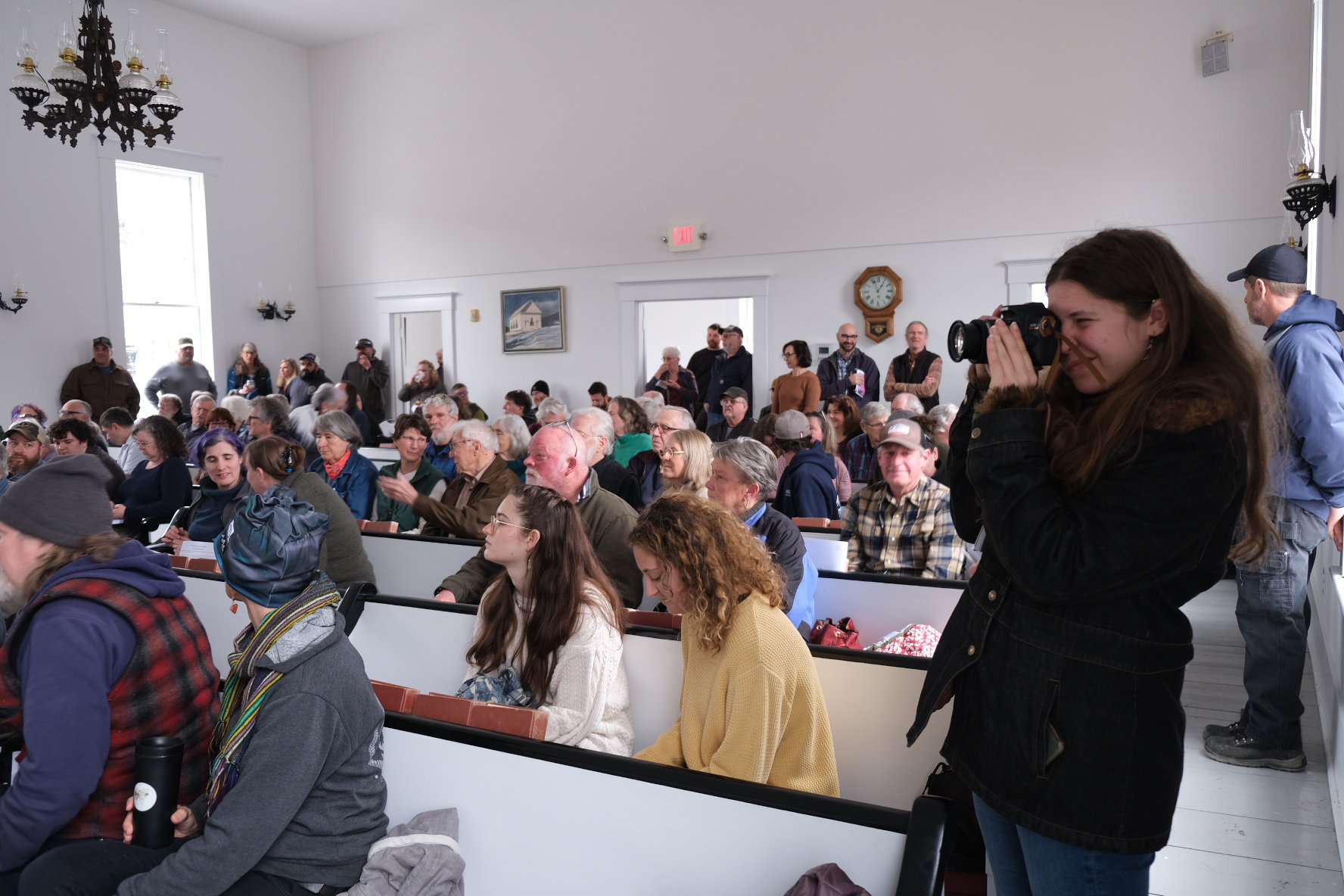 UVM student reporters covered an unusually busy Town Meeting Day in the small town of Stockbridge. Credit: Elizabeth Hewitt
UVM student reporters covered an unusually busy Town Meeting Day in the small town of Stockbridge. Credit: Elizabeth Hewitt
As local news deserts grow, universities are stepping in. With initiatives ranging from student-staffed statehouse bureaus to newspapers run by journalism schools, these academic-media partnerships are bolstering local news.
“It’s a short-term win and it’s a long-term win,” says Penny Muse Abernathy, a visiting professor at Northwestern University’s Medill School of Journalism, and co-author of the local news report.
University-media partnerships provide reliable local news coverage in communities where it is needed. In the process, students get hands-on experience with community decision-making in a way that shapes their careers and worldviews going forward.
Credit: Elizabeth Hewitt
Sarah Andrews and two of her classmates covered Town Meeting Day for the White River Valley Herald, the weekly newspaper that covers 16 communities in Vermont’s rural Upper Valley region.
“Too often over the last 20 years, we’ve tended to focus on teaching students what we assume are professional digital skills for the digital age, when in fact journalism at its core teaches not only the journalist but the citizen how to employ critical thinking and make wise decisions,” says Abernathy.
Closures of smaller news outlets over the last several decades have left many regions without reliable media coverage. Since 2005, the number of newspapers in the US has dropped by a third, and the number of journalists has declined by 60 percent. The erosion of local news makes it harder for community members to be aware of the issues in their regions.
“Most of the decisions that affect our immediate everyday life occur at the local level,” says Abernathy.
Through university-led journalism programs, students — under the tutelage and editorial supervision of faculty members — are stepping in to fill in some of those gaps. The model isn’t new: The University of Missouri has been practicing a “teaching hospital” approach that involves students in community news coverage since 1908. Now, in the current media landscape, higher education institutions are looking at how they can both offer students enriching experiences and contribute to communities, according to Richard Watts, who heads the University of Vermont’s Center for Community News.
Crushed by negative news?
Sign up for the Reasons to be Cheerful newsletter.
[contact-form-7]
“Students like to do things that are real,” he says. “There’s a sense of agency about writing real stories that real people read and make a real difference.”
There are about 120 such programs at colleges and universities across the country, according to Watts. The Center for Community News found in 2023 that over the last year, more than 2,000 student journalists across the US had produced more than 10,000 news stories that were published in community outlets. The stories were estimated to reach more than 14 million people.
Often offered to students in the forms of classes, the programs require a high level of commitment from faculty members — editing stories for publication is more intensive than typical grading. Across different regions, the scope and focus of programs varies, says Watts.
Louisiana State University’s Manship School of Mass Communication has taken advantage of its location a few miles away from the State Capitol to bolster coverage of the legislature.
News coverage of state policy-making is among the casualties of the erosion of local news. Across the country, the number of reporters covering statehouses full-time declined by 34 percent between 2014 and 2022.
 Claire Sullivan has been an LSU Manship School Statehouse reporter for both the 2023 and the 2024 sessions. Credit: Ria Salway
Claire Sullivan has been an LSU Manship School Statehouse reporter for both the 2023 and the 2024 sessions. Credit: Ria Salway
As press coverage of the Louisiana legislature diminished, LSU launched a statehouse bureau in 2016. Through a high-level journalism class, student reporters cover committee meetings and floor proceedings. Grant funding allows the program to keep students on as interns to cover the weeks of the legislative session after the semester ends. Christopher Drew, a former New York Times investigative reporter and editor who heads the bureau program, edits the stories. Then they’re made available for any news outlet to publish for free.
Ninety-five outlets have run LSU student statehouse stories, ranging from some of the state’s largest newspapers to small weekly and bi-weekly papers, many of which Drew says wouldn’t have another option to get stories about news from the statehouse.“Our students never have any problem getting taken seriously by lawmakers because we often are the hometown reporter for the lawmakers,” says Drew. “A lot of them come from places [where] the only thing that constituents could read about what they do comes from what the LSU students do.”
The idea is spreading; 20 states have some form of university-led statehouse bureau, and Drew is involved in conversations with schools interested in launching programs in additional states. LSU also offers an investigative journalism course, focused on civil rights era cold cases, which similarly distributes stories to outlets. Drew is working on a new project that would create a network of universities and colleges around Louisiana, partnering journalism programs with small local news outlets.
LSU senior Claire Sullivan is taking the statehouse course for the second time this spring. She sees the community news model as mutually beneficial for students like herself who want experience and local news outlets that want coverage.
“It’s the best kind of motivator,” says Sullivan. “You want to do your best job for the local outlets.”
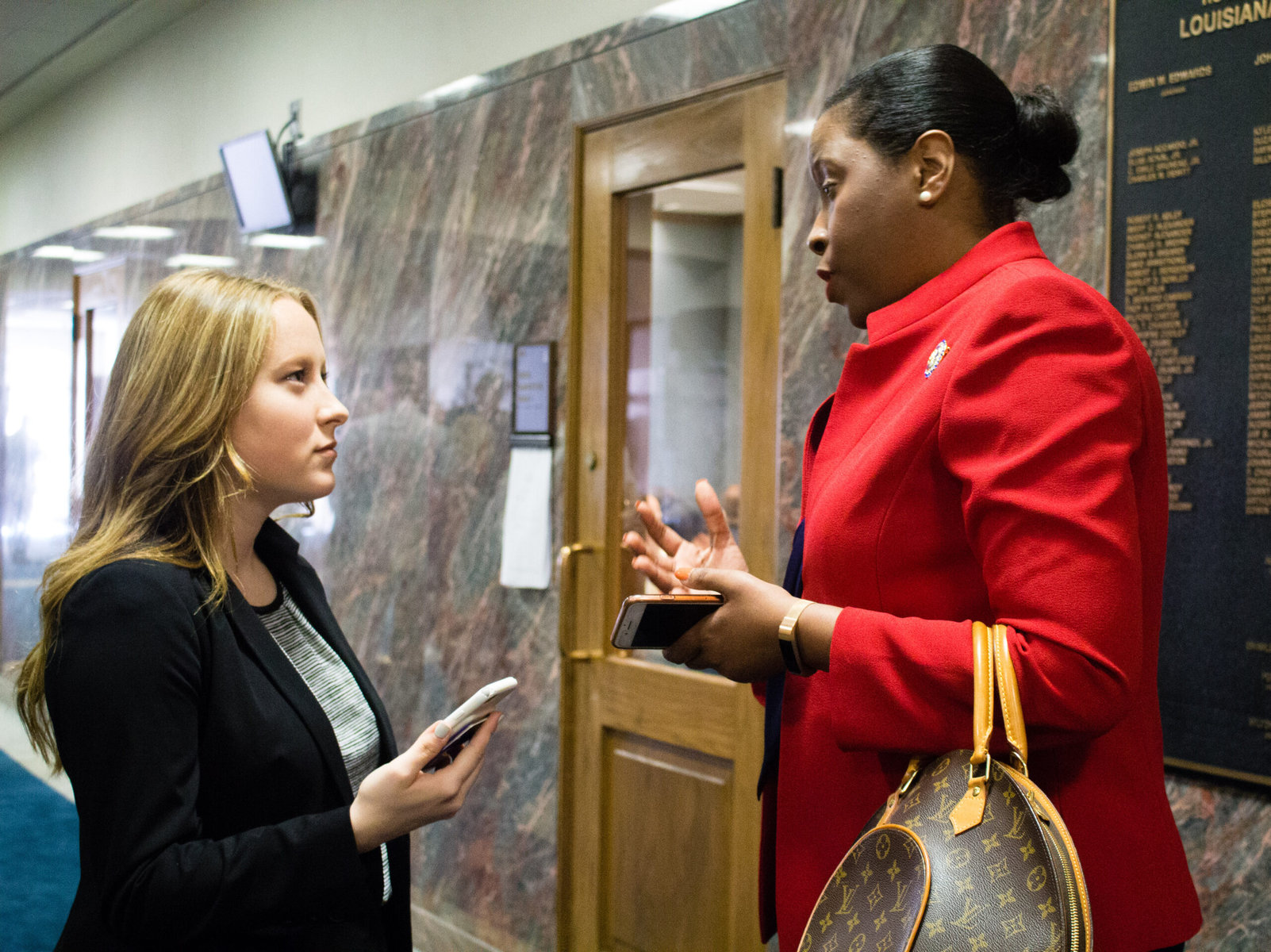 Devon Sanders, an LSU Manship School Statehouse reporter, interviewed State Representative Katrina Jackson in 2018. Credit: Katherine Seghers / LSU
Devon Sanders, an LSU Manship School Statehouse reporter, interviewed State Representative Katrina Jackson in 2018. Credit: Katherine Seghers / LSU
The Oglethorpe Echo has been covering the issues of Oglethorpe County in northeastern Georgia since 1874. The weekly was poised to shut down in 2021, when the long-time publisher was ready to retire. Instead, a community member hatched a plan for the local paper to be taken over by the University of Georgia’s Grady College of Journalism and Mass Communication.
Over the last two and a half years, students have reported the stories that fill the Echo’s pages. During fall and spring semesters, the newspaper is staffed by students in a senior capstone class. Over summer and winter breaks, students are hired as interns, so there’s no break in news coverage. The paper was converted to a nonprofit, and Andy Johnston, a longtime sports journalist who had been an adjunct professor, came on as the paper’s editor.
Student journalists have dug into issues related to limited rural broadband access, and use of a particular form of fertilizer on local farms. In its first full year of operating under the university, the paper won nine awards from the Georgia Press Association.
Courtesy of Grady College of Journalism and Mass Communication
The Oglethorpe Echo nearly shut down in 2021. Instead, the University of Georgia’s Grady College of Journalism and Mass Communication took over the paper. Now, student stories fill its pages.
One difference between university-led media and traditional local outlets is that student reporters turn over frequently, so they don’t have the long-term knowledge and relationships that a professional reporter would. But editors — both employed by universities and with community news outlets — help provide that expertise. In Vermont, when the White River Valley Herald picks up stories written by UVM students, editor Tim Calabro says he occasionally adds in local context that students don’t know.
When the University of Georgia took over the Echo, Johnston says there was an adjustment period of building trust with the community. The university is located about 25 miles west of Oglethorpe County, so students don’t live locally. But the feedback he gets is generally positive. Readers appreciate having a local news source, and they particularly like slice-of-life stories that feature their friends and family members.
“We’re writing to tell the stories of the community, tell the stories of the county,” he says.
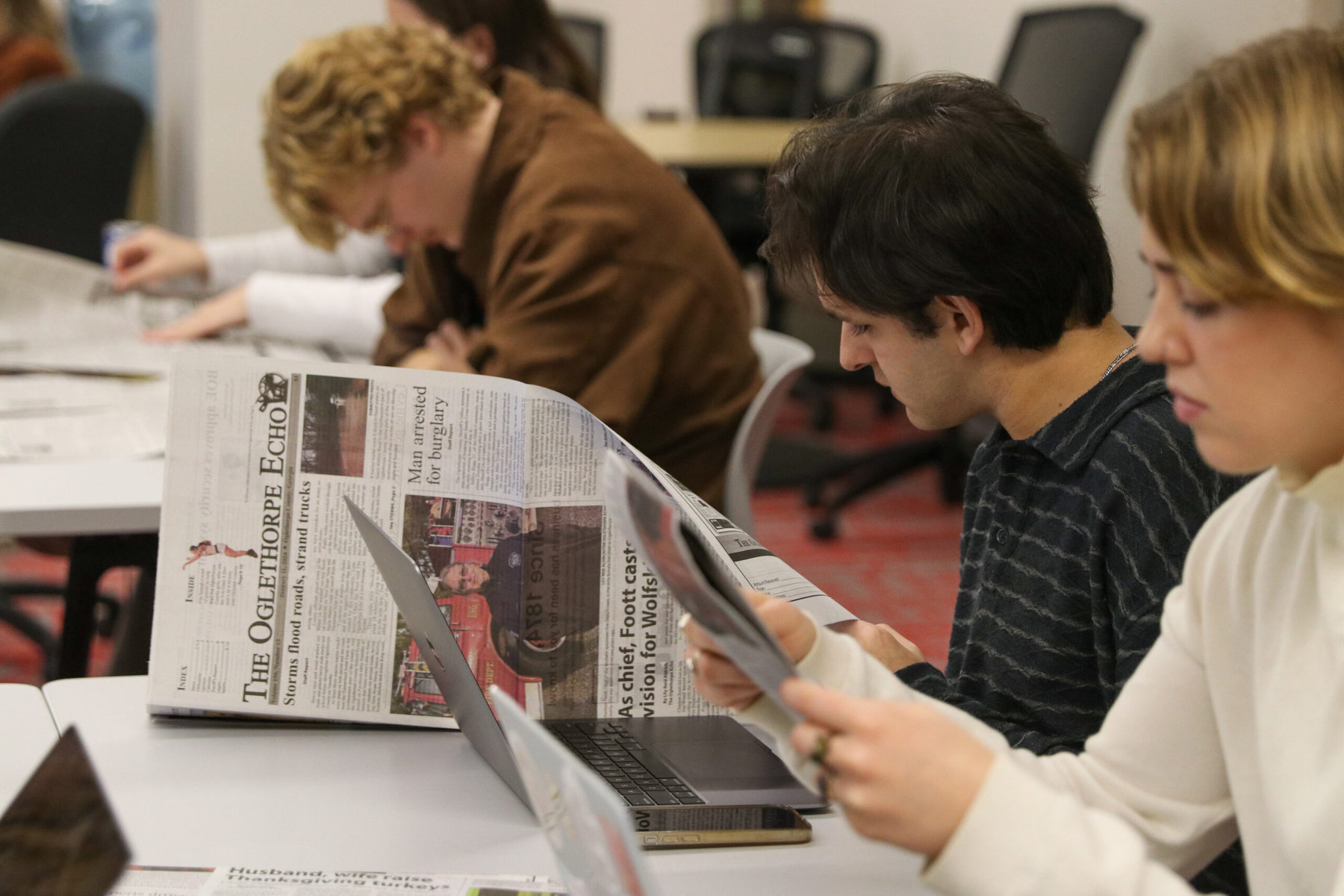 Current Echo students Michael Johnson (left) and Izzy Wagner read through a copy of The Oglethorpe Echo. Courtesy of Grady College of Journalism and Mass Communication
Current Echo students Michael Johnson (left) and Izzy Wagner read through a copy of The Oglethorpe Echo. Courtesy of Grady College of Journalism and Mass Communication
Back in Vermont, on Town Meeting Day, a total of 139 people voted in the election for Stockbridge’s new select board member. Two days later, Andrews’ story about the election ran in the White River Valley Herald.
For the Herald’s editor, Tim Calabro, UVM students’ stories helped his limited staff cover news around the region on the biggest single day for local government of the year. But Calabro says there are broader benefits of the program beyond filling the paper with news.
“Of all the dangers that newspapers, news organizations of any stripe are facing, the biggest worry is that people just won’t care about what’s going on in their communities,” Calabro says.
Not every student who goes through a university-led news program will go on to a career in journalism, he says. But even for those without ambitions in journalism, he sees this kind of program as valuable for engaging young people in communities: “Being a human being in society,” as Calabro puts it, “it’s good to care about society.”
The post As News Deserts Expand, Student Journalists Step Up appeared first on Reasons to be Cheerful.
Chinese universities want more Australian students: we should send them
Australia is trailing its neighbours in the race to acquire China knowledge and capability, which can only come from in-country experience, writes Louise Edwards. Chinese universities are keen to see more Australian students in their courses and on their campuses. At Beijing’s most important annual political meetings held in March this year, the Director of Continue reading »
Big Oil’s Multi-Billion-Dollar Influence Exposed as Cambridge University Cuts Funding Ties
As Cambridge University this week announced it has temporarily stopped taking donations from fossil fuel companies following years of pressure, Byline Times can reveal the multi-billion-dollar influence big oil has on politics.
Academics from the university, together with others from around the world, met at Jesus College earlier this month and proposed forming an international unit to "monitor the political activities of firms and trade associations in the fossil fuel sector" amid mounting evidence of a disinformation campaign. At the workshop, it was revealed big oil had spent at least $3.3 billion trying to influence the narrative around climate change and fossil fuels over a 10-year period.
The Intellectual Forum meeting came as the university, on 18 March, halted donations from big oil due to concerns about how it may impact the institution's high research reputation and as part of its “commitment to address climate change through a transition to a zero carbon world.” It also follows a report last year by former UN climate change envoy Nigel Topping that recommended it and warned of the “high reputational risk” the university's relationship with big oil presented. The report stated that the funding amounted to £3.3 million per annum over the last six years.
While welcoming the university's funding and monitoring unit decisions, Kevin Anderson, Professor of energy and climate change at Manchester University, said he hoped it would herald a complete rethink.
“Perhaps after two decades of mitigation denial the academic and wider expert community will find the courage to call out the Emperor is naked," he told Byline Times.
Benjamin Franta, a senior research fellow on sustainability at Oxford University, added: “It’s long past time for the fossil fuel industry’s influence over academic research to be scrutinised. We need integrity in academic research to develop climate solutions we are all depending on.”
The workshop heard that researchers from Cambridge, Oxford, Harvard and a host of other blue-chip international universities, had found that the fossil fuel sector is engaged in major attempts to muddy the waters around climate science and undermine a transition to clean technology. It is doing this, academics argued, in a variety of different ways including funding research at respected educational establishments, through think tanks and direct political lobbying.
Christian Downie, Associate Professor at Australian National University, said that many of the “firms and industry groups that provide funding to universities do so to shape policy and public opinion in ways that are consistent with their commercial interests and not the science on climate change". He added: “We also know that some of these organisations spend tens of millions of dollars (USD) each year funding lobbying and other activities designed to delay and block action on climate policy."
The professor told the workshop that trade associations in the US had spent $3.4b between 2008 and 2018 on political activities centred on the climate crisis. This included $2.16b on advertising and promotion, $729 million on lobbying and more on grants and direct political contributions, he said, before noting, “This is just the tip of the iceberg”.
“We don’t really know how much they spend…(but we do know) that funding can produce biased research, strategy and findings," he said.
Jeremy Baumberg, a professor at the Cavendish Laboratory in Cambridge and a fellow of Jesus College, argued that the issue of fossil fuel funding was “really complicated” and raised “ethical, moral and personal challenges".
Cambridge, like other universities, has been under continued pressure from students, staff members, and climate activists, to sever ties with the fossil fuel industry but administrators have been reluctant.
Student newspaper Varsity revealed in February 2023 that chemistry undergraduates were still being handed BP-branded lab coats even though the annual BP Sustainability Lecture had been dropped. A few months earlier, the university announced that the BP Institute on the outskirts of the city would be renamed the Institute for Energy and Environmental Flows. Students occupied the buildings in May 2022.
At the time, Professor Andy Neely, then a senior administrator, or Pro Vice Chancellor, at Cambridge, insisted that while energy transition was urgent “it is not possible at the pace and scale required without the current (oil) industry’s involvement and willingness to transition".
The row over misinformation by oil companies has been rumbling on for decades with a report in 2015, The Climate Deception Dossiers from the US-based Union of Concerned Scientists, arguing that there was abundant evidence that corporate leaders knew their products were harmful as far back as 1981, but were still actively deceiving the public and denying this harm.
Jason Scott-Warren, a Cambridge professor of early modern literature and a leading voice in the university’s climate debate, said Cambridge's decision to stop taking funding should just be the starting point: “A growing understanding of the threat to academic integrity was a key factor in Cambridge’s decision to impose a temporary moratorium on new funded collaborations. We now need this to be followed up with a permanent ban on funds from obstructive forces.”
The Funding Crisis in Schools is Reaching Catastrophic Levels
The heads of a school in the East Midlands have written to parents to explain they don't have enough money to give their children the education they expect.
Leicestershire School Heads detailed the challenges 14 years of inadequate Government funding and sustained high inflation on increasing costs was having, telling parents "none of these changes have the interests of our children at the heart of them and all are detrimental to their educational experience".
"Sadly there is no way our school, like many others, can continue as it is," the letter continued.
The Heads also voiced their concerns that quality of education will not be maintained in the medium term due to the chronic shortage of qualified teachers. The Head of Brookvale Groby Learning Campus (BGLC) included a second, more detailed, letter detailing the challenges school leaders face.
It states that for the first time, BGLC is facing an in-year deficit of nearly £500,000 with the most significant factor being unfunded and partially funded pay rises amounting to almost £400,000. Other issues include inflationary pressures on goods, spiking utility costs with the electricity bill being over £32,000 a month, daily cover rates for supply teachers rising with fewer qualified teachers in the system, and a significant increase in unqualified instructors.
This follows years without any significant additional pupil funding; even Covid pandemic catch up grants have ended.
The Head sets out the very tough decisions he has discussed with other leaders locally and nationally, saying “the outlook is bleak financially for education…the following outcomes are very likely.”
The letter pleads with parents to raise concerns with local political candidates about the “relentless recruitment and retention crisis for teachers and support staff”, the lack of funding for SEND (special educational needs and disability) and the budget deficits they face as they try to manage students with more complex needs. It also urges them to raise the need to address the reduction and underfunding of external agencies to support the most vulnerable students and the mental health crisis in young people with long waiting lists for help.
“Students only get one chance at education, we owe it to them to make sure that their chance is top of everyone's agenda," the letter concludes.
Robin Bevan, Headteacher of Southend High School for Boys, a grammar school, and former president of the National Education Union (NEU) broke down the financial crises state schools are facing in 2025 to Byline Times, explaining: “You can analyse it in three ways.
“(1) individual school case studies, with examples where to 'balance the books' during next year and 25/26, schools will need to make 30+ redundancies (i.e. cease to operate)
(2) looking at funding rates (such as the School Cuts website) which illuminate the 10%+ decline in real terms
(3) examining the rate at which reserves are being 'burned through' to support revenue expenditure: which would suggest 1/3 of schools will run out of cash in the next 18 months
He added: “The shortfall on-premises maintenance is shocking too: I now have a backlog of capital repairs in excess of £750k.”
The staffing crisis in education is set to worsen over the next few years with the Department for Education's 2023 data release showing that 39,930 teachers left teaching for reasons other than retirement in the previous academic year representing 8.8% of the workforce. It was the highest number since records began in 2010.
The latest Initial Teacher Training (ITT) census statistics show the Government has missed its target for secondary teacher recruitment by 50% this year and also missed the primary target by 4%. The secondary school target has been missed in ten out of the last eleven years.
The target for recruitment to teacher training for both primary and secondary was missed by 38%. This continues a sustained downward trend in applications over several years, with 26,955 new entrants to ITT in 2023-24 compared to 40,377 in 2020-21.
Geoff Barton, general secretary of the ASCL school leaders’ union, has said the “catastrophic shortfall in postgraduate trainee teacher recruitment has plumbed new depths”, and “is simply not sufficient to meet the needs of the education system, and we then lose far too many early in their careers.”
Physics is the worst-affected subject, with just 17% of the target reached this year. In mathematics, 63% of the required teachers were recruited, down from 88% last year, which calls into question the viability of Rishi Sunak's proposals to make mathematics compulsory up to the age of 18.
The English target was missed by 74%, and the proportion of the chemistry target met fell from 83% to 65%. Drama dropped from 111% to 79%, art and design halved from 88% to 44%, religious education went from 75% to 44%, and music fell from 62% to 27%.
Only three subjects were recruited above the target number of trainee teachers, classics 196%, PE 181% and history 119%.
Per-pupil funding is due to rise by 1.9% next year and according to Education Secretary Gillian Keegan, the School Teachers Review Body tasked with making pay recommendations has been instructed to consider the “impact of pay rises on schools’ budgets.”
Based on these indicators, the education unions believe the pay award will be between 1% and 2% leading the NEU and NASUWT to begin consulting members for potential industrial action.
How Teen Girls in Mumbai Are Learning to Stand Tall
As Nausheen, a 14-year-old Mumbai schoolgirl, demonstrates the kicks and punches she has newly learned, there is a perceptible change in her body language. From a shy, giggly teenager, she turns into a budding supergirl: somehow she seems taller, her stance straighter and her voice louder.
“When I practice these moves, I feel a surge of power inside me,” she says. “I feel like I don’t have any fear.”
Nausheen has been learning martial arts — among other concepts such as consent and communication — at the free biweekly workshops conducted by the nonprofit MukkaMaar at her government school in a crowded Mumbai suburb. “I have learned to be strong and to face people with confidence,” she says, “whether it is my parents at home or strangers outside.”
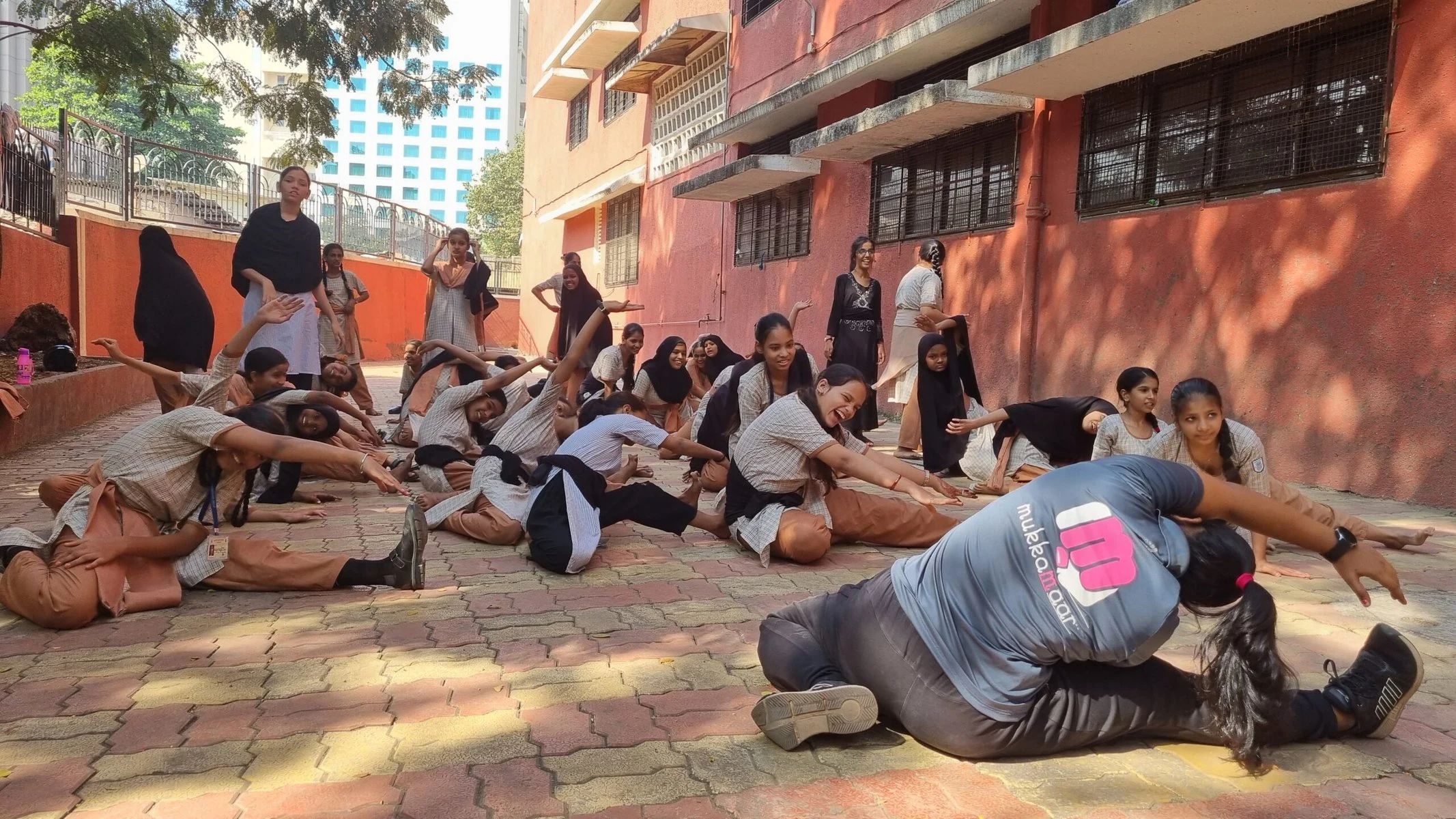 MukkaMaar partners with 56 government schools in Mumbai. Courtesy of MukkaMaar
MukkaMaar partners with 56 government schools in Mumbai. Courtesy of MukkaMaar
Contrast this with what MukkaMaar’s founder Ishita Sharma remembers from a casual conversation with a group of middle-school girls a few years ago. When asked what they would do if someone attacked them on the streets, they unanimously responded: Shout bachao bachao! (help).
“They didn’t even think about it,” Sharma says. “It was a natural response to expect someone else to come and save them, because that is what they have been taught, what they have seen in movies.”
It was with the basic aim to shift this control from the outsider to the individual that Sharma started MukkaMaar — roughly translating to “throw a punch” — as an empowerment program for adolescent girls. “Women need to take responsibility for their own safety and not succumb to the ‘What will the poor woman do?’ narrative,” she explains.
Courtesy of MukkaMaar
At MukkaMaar’s free workshops, girls learn martial arts and build confidence. They also learn about communication and consent.
Sharma began in 2016 with four girls on a public beach and the conviction that teaching self-defense was the way to empower them. Over seven years and 3,000 girls later, she has learned that along with martial arts, there is also a need for a change in fundamental beliefs and attitudes. She shares examples of how these girls are schooled to be “good daughters” who grow up to be “good wives” (for instance, to blindly marry the man chosen by their parents, as opposed to committing to a “love marriage”). She explains that there is a need to teach them to question and debate at home, negotiate for their rights, develop and assert their own personalities, and so on.
MukkaMaar now partners with 56 government schools in Mumbai, where martial arts teachers are trained to listen to and counsel the girls, who open up with their own stories. These trainers are young men and women in their late teens and 20s, who usually work in teams of two. At 19, national level boxing champion Aradhana Gaund is not much older than the girls she trains. “They treat me like their friend, and I laugh and cry with them,” she says.
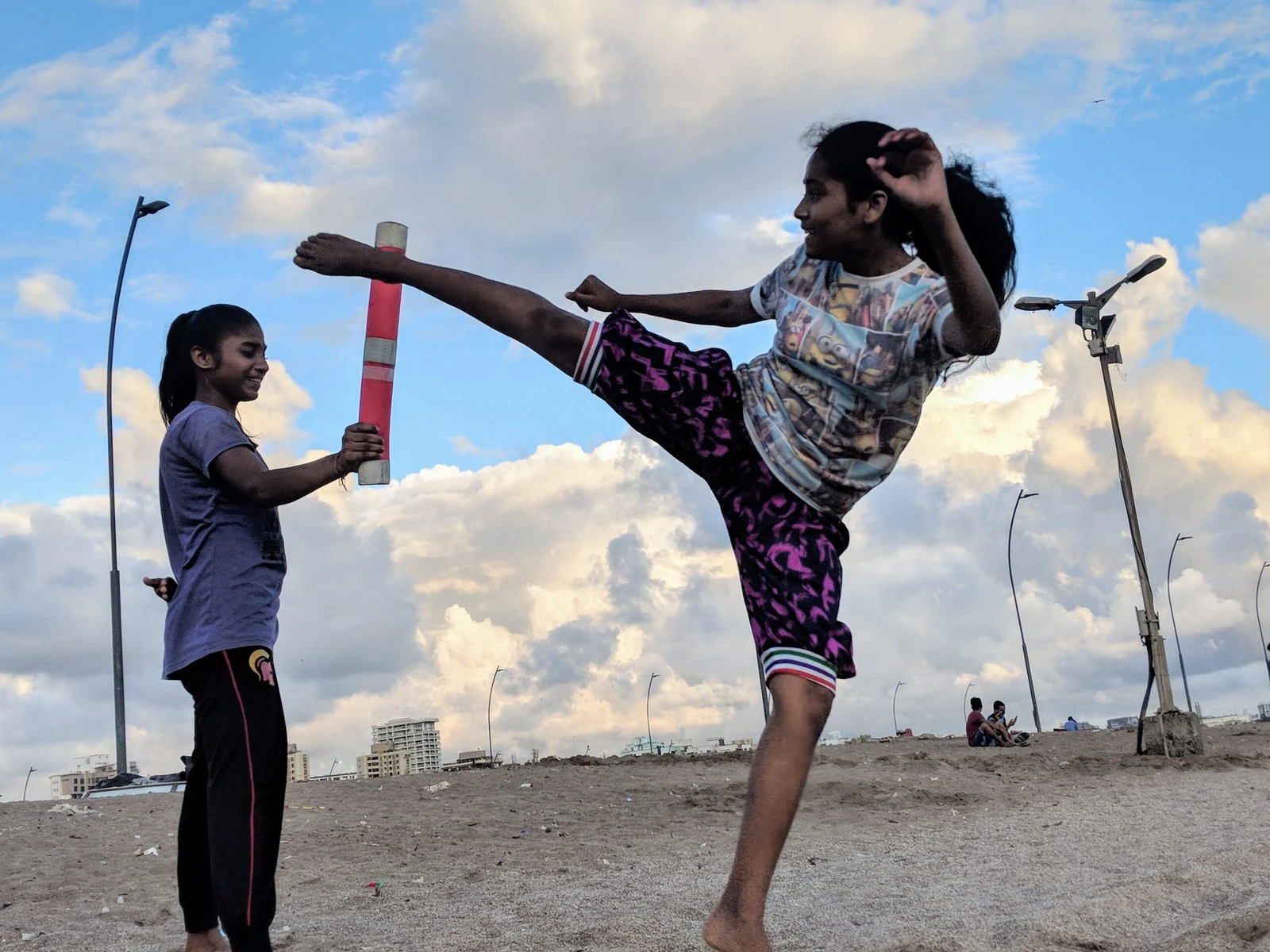 In the workshops, girls learn that violence is not a knee-jerk response, but a last resort. Courtesy of MukkaMaar
In the workshops, girls learn that violence is not a knee-jerk response, but a last resort. Courtesy of MukkaMaar
Elsa Marie D’Silva, founder of Red Dot Foundation, a nonprofit working to create safe spaces for women, says it can be intimidating for young women to stand up against harassment, and so “it is important to show them how they can speak out together, along with their friends or as a group, to call out bullies.” Indeed, this is one of the things that gives Gaund the most satisfaction: seeing how these classes have taught the girls to band together and support one another.
According to the Global Gender Gap Report 2023, India ranks a dismal 127 out of 146 countries, based on indices such as access to education, economic opportunities and health. What is even more concerning is the unceasing, systemic violence against women that takes several forms including intimate partner violence, rape and assault, dowry deaths, acid attacks and everyday street harassment.
Crushed by negative news?
Sign up for the Reasons to be Cheerful newsletter.
[contact-form-7]
Women are told from childhood to keep their heads down and take these things in stride, that to react would be futile and even dangerous. They internalize this to such an extent that they suffer harassment silently, which in turn encourages their abusers to carry on with impudence. This is where MukkaMaar has been making a small but significant difference.
Iqra, 13, says, “Earlier, I used to move away quietly when a man touched or groped me in the [public] bus. But now, I just make my voice loud and strong like I have been taught, and tell them to stop it.” At this, her friend Fatima chimes in, “Now we feel like we can also walk and talk like the boys.”
Courtesy of MukkaMaar
Ishita Sharma started MukkaMaar with the goal of changing girls’ “natural response to expect someone else to come and save them” — and showing them that they can be the ones in control.
But they have both also been taught that violence is not a knee-jerk response, but a last resort. “If we fight, we will also get hurt, but we can speak up,” Iqra declares with the wisdom of one far older.
And speak up they do, at every chance. “At my cousin’s wedding, a boy I don’t know started teasing me,” Fatima recalls. “When I shouted at him, his mother intervened and scolded him. Earlier I used to feel nervous in such situations, I used to think, ‘I am a small girl, what can I do?’”
As Sharma describes it, “We are not telling them that violence is the answer, but that violence should not be tolerated.”
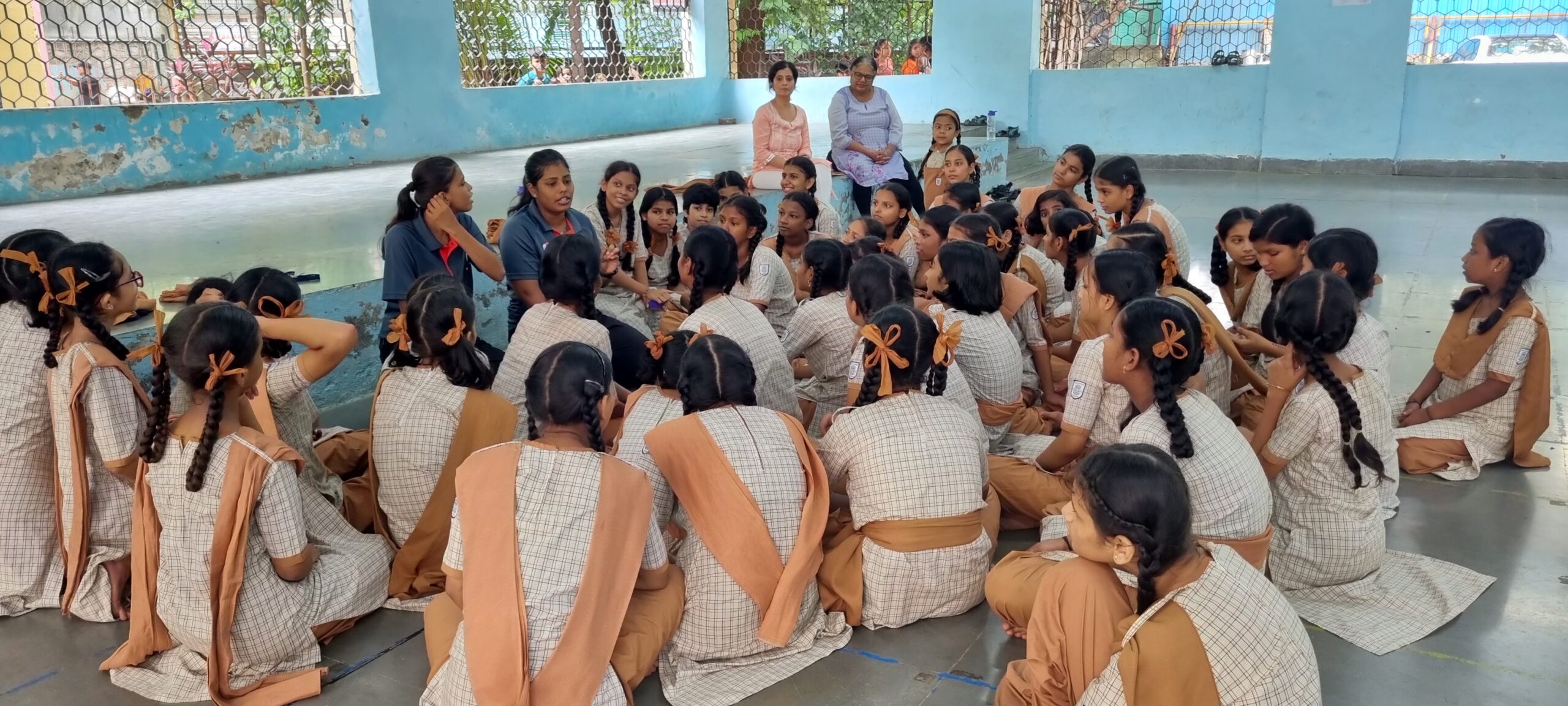 “We train them to vocalize their feelings, to open up their shoulders and lift up their chins,” explains one of MukkaMaar’s trainers. Courtesy of MukkaMaar
“We train them to vocalize their feelings, to open up their shoulders and lift up their chins,” explains one of MukkaMaar’s trainers. Courtesy of MukkaMaar
The MukkaMaar website states, “It is necessary to recognize that violence includes microaggressions, discrimination, threats, and loss of opportunity as much as assault.” The training, therefore, does not just cover self-defense but also building physical fitness and emotional strength, as well as boosting (and often instilling) self-confidence.
Senior training fellow, Bhishma Mallah, 26, who has been with MukkaMaar for over four years, says that the girls begin with so many barriers, like shame and fear, that even to get them to exercise in front of others or to express themselves verbally is a challenge. “We train them to vocalize their feelings, to open up their shoulders and lift up their chins. We have to tell them repeatedly to forget about adjusting their dupatta [traditional scarf used to cover head or shoulders] and focus on the activity.”
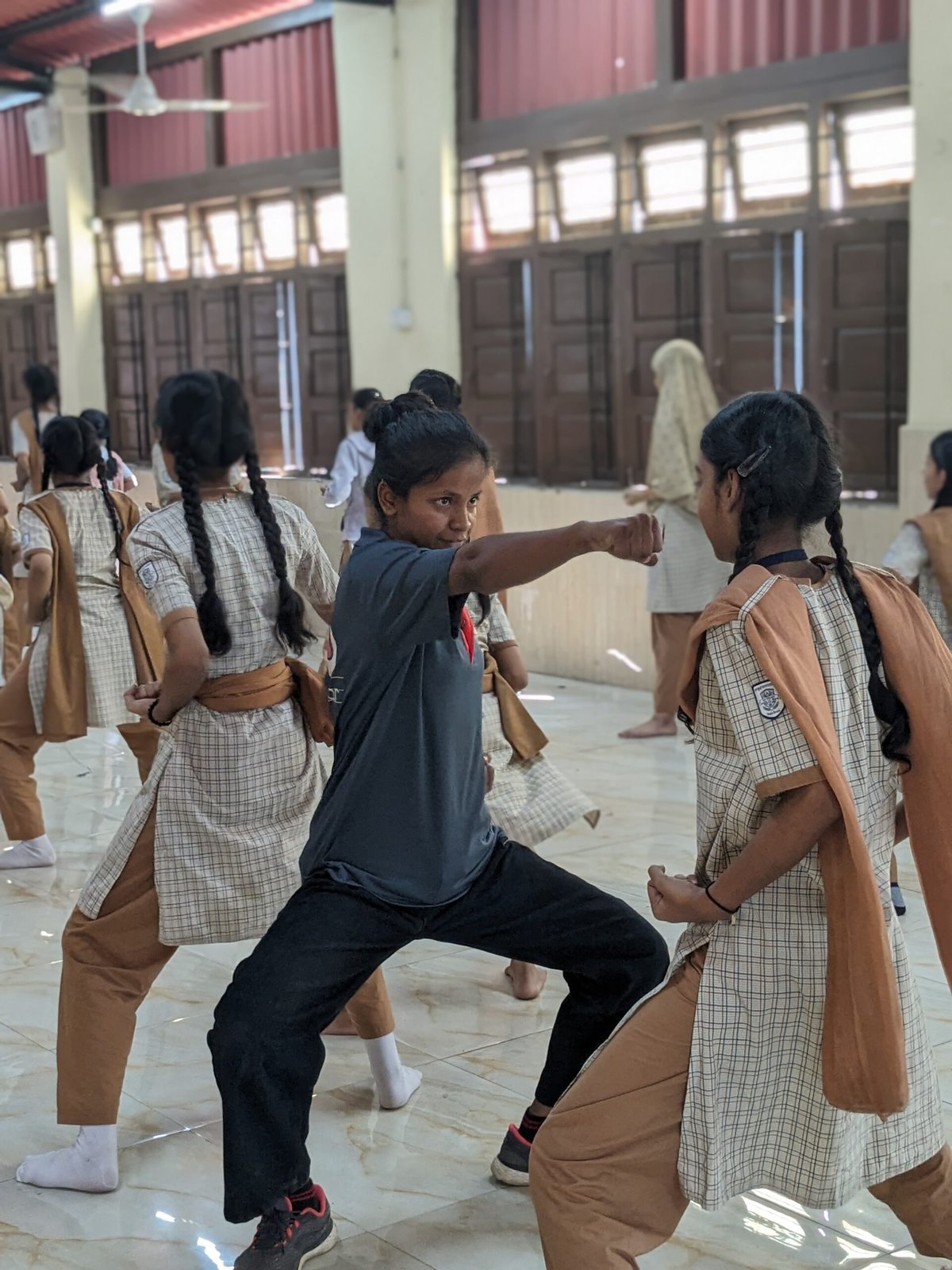 Even during workshops, the girls ask for permission before making physical contact. Courtesy of MukkaMaar
Even during workshops, the girls ask for permission before making physical contact. Courtesy of MukkaMaar
One of the many ways in which the trainers chip away at the diffidence of these young girls is by making them chant “I am important” even as they practice their moves. Or asking them to imagine how a dog growls, and to channel that aggression in their kicks and punches.
Each hour-long session includes 20 minutes of conversations and counseling, with the remaining time devoted to physical training. “We teach them about concepts like boundaries, consent and safe touch. Even during lessons, they have to take permission from their partner before any physical contact,” explains Mallah.
Sharma admits it took her a couple of years to realize that for a girl to build agency, there is a lot of familial and social conditioning that needs to be undone. “There is no point in teaching them martial arts alone, with its focus on discipline and technique — because unless we teach them critical thinking, it is all pointless, and forgotten the minute they step out of the classroom,” says Sharma.
Red Dot Foundation founder D’Silva adds a word of caution: “It’s not enough to just empower the girls to speak up, it is also the responsibility of adults to listen to them when they do. If their parents or teachers don’t take them seriously, then the child will quickly learn not to tell anyone — because there is the added fear of having their personal freedom curtailed under the guise of protecting them or saving the family honor.”
A change in the larger ecosystem may take a long time, but it is clear that something is shifting within these girls. While one cohort confronted a cop making a video call in front of them and challenged him to prove he was not taking their photos without permission, another group of girls gathered the courage to file a police complaint against their physical education teacher who had been harassing them. For others, it has meant something as seemingly trivial as talking back to their fathers and challenging gendered rules and restrictions.
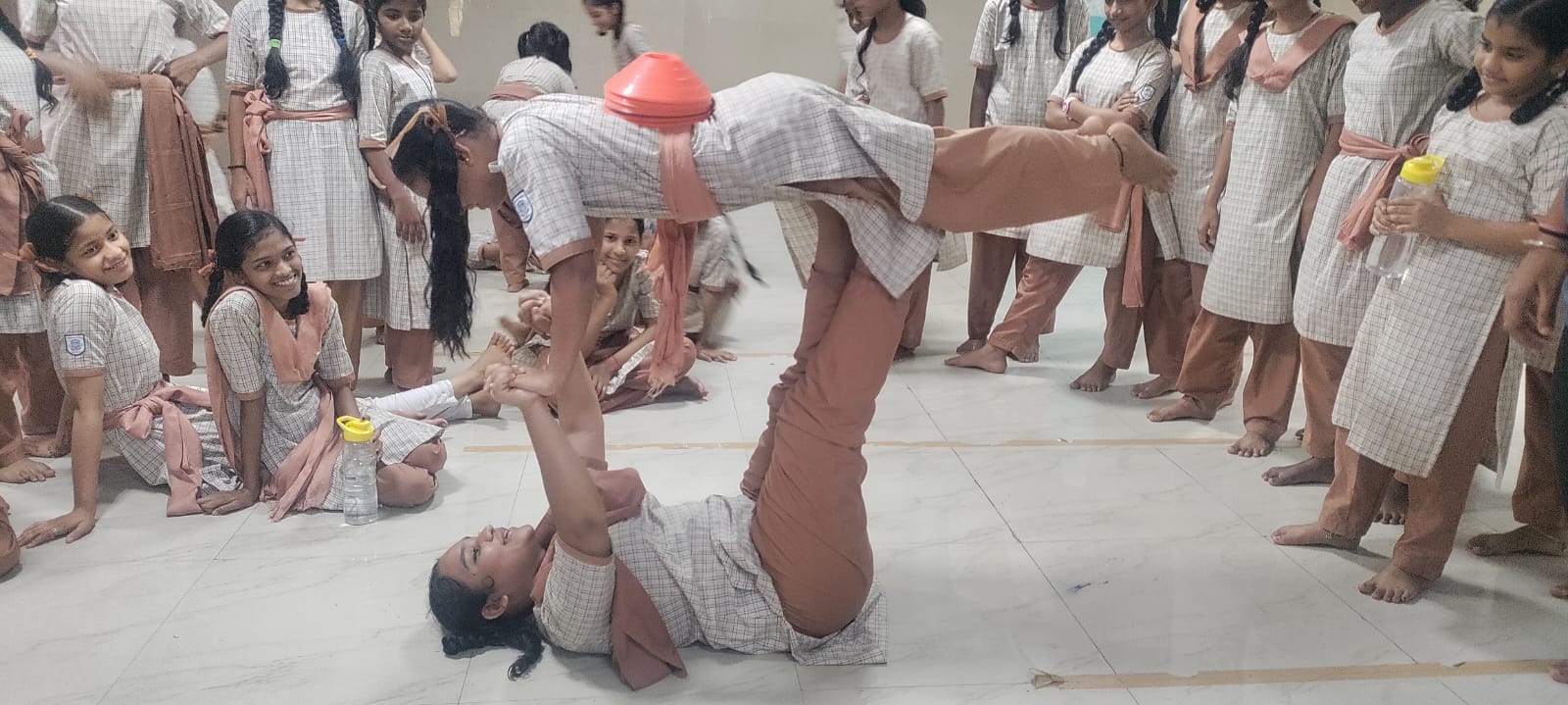 “I have learned to be strong and to face people with confidence,” one MukkaMaar student says, “whether it is my parents at home or strangers outside.” Courtesy of MukkaMaar
“I have learned to be strong and to face people with confidence,” one MukkaMaar student says, “whether it is my parents at home or strangers outside.” Courtesy of MukkaMaar
These may seem like small incidents, but for these young girls in Mumbai, the freedom to think independently and challenge those around them has been life-changing.
In the short run, Sharma says MukkaMaar wants to focus on fewer places and create retention, rather than spread the program thin all over the city. The future is digital for MukkaMaar alumni, with a chatbot that helps the girls have a two-way conversation about self-defense techniques, physical fitness, understanding of different types of gender violence and soft skills like communication and negotiation. This keeps them connected to the program, and to everything they learned in it, even after they leave.
The post How Teen Girls in Mumbai Are Learning to Stand Tall appeared first on Reasons to be Cheerful.
Students occupy Bristol uni building in protest at ‘profits from genocide’
Students demand divestment and an end to academic ties
Bristol University students have taken control of one of the university’s Wills Memorial Building in a protest to demand an end to its ‘complicity with arms companies’ and to call for a series of actions on its part to ‘support Palestine and Palestinians’:
The demanded actions include:
- an end to cooperation with weapons manufacturers
- protection for Palestinian students and special consideration for those taking exams who have been affected by Israel’s slaughter in Gaza
- protection for anti-Zionist beliefs among staff and students – an issue on which Bristol university has a shameful record and has been the scene of intense pressure campaigns by pro-Israel groups claiming that anti-Zionism, opposition to the settler-colonial state that has displaced Palestinians and treats them as inferior
- recognition of the existence of Palestine – an existence denied by hardcore supporters of Israel
- scholarships for Palestinian refugees
Israel has killed over forty thousand Palestinian civilians, more than two thirds of them women and children, and injured twice as many, in its genocidal assault on Gaza and has ignored orders from the International Court of Justice to cease its slaughter and allow food, fuel and medicines into Gaza immediately. Gaza is now in famine, with experts predicting that more will die in the coming months from hunger and disease than from Israel’s bombs, missiles and bullets, with children again worst affected.

Palestinian flags can be seen through the Wills building’s doors. The figures in the second image have been blurred to protect identities.
The group is also demanding an end to the use of a ‘check-in’ system that tracks the location of students.
Wednesday’s action is not the first by Bristol students demanding justice for Palestinians and an end to discrimination against them and their supporters. Four months ago, students protested in the university’s ‘profits from genocide’:

And earlier this month, a group occupied Bristol University’s Victoria Rooms in a pro-Gaza protest.
The British government has mounted a pressure campaign against universities, threatening to defund them if they allow ‘extremism’ or ‘antisemitism’ in the form of pro-Palestinian speech and activism. Shamefully, a number of universities have capitulated to pressure from the UK state and from pro-Israel groups claiming that speech against Israel’s crimes and occupation of Palestinian land infringe on their rights and constitutes ‘hate’ toward Jews, even though many UK Jews oppose Israel’s actions and oppression of Palestinians.
Last month, former Bristol professor David Miller won a landmark employment tribunal case against the university, which had sacked him after pressure from pro-Israel groups, despite lawyers it appointed to run two investigations finding that he had said nothing antisemitic. The win set a precedent that anti-Zionist political beliefs are a protected characteristic under equalities law and cannot be used as grounds for dismissal. Skwawkbox understands that Prof Miller is not involved in the students’ protest.
Solidarity with students in Bristol and elsewhere who are demanding an end to complicity in war crimes.
SKWAWKBOX needs your help. The site is provided free of charge but depends on the support of its readers to be viable. If you’d like to help it keep revealing the news as it is and not what the Establishment wants you to hear – and can afford to without hardship – please click here to arrange a one-off or modest monthly donation via PayPal or here to set up a monthly donation via GoCardless (SKWAWKBOX will contact you to confirm the GoCardless amount). Thanks for your solidarity so SKWAWKBOX can keep doing its job.
If you wish to republish this post for non-commercial use, you are welcome to do so – see here for more.
Universities make astounding discovery: AUKUS lacks a social licence!
A not-so-happy anniversary: Usually, a first anniversary is an occasion for all-round rejoicing and back-slapping. So, it was to be expected that there’d be universal self-congratulation on the first anniversary of Anthony Albanese’s, Rishi Sunak’s and Joe Biden’s announcement on 13 March 2023 that Australia would purchase nuclear-powered attack-class submarines from the US as part Continue reading »
A university career is no longer the best way to channel a fine mind
A friend of mine resigned from her university job in February 2024 just weeks before term started. She couldn’t face another year. She was old enough to retire but I had thought she might have a couple more years of teaching in her. The bureaucracy, the rules, lowering standards were too much. Another friend, an Continue reading »






